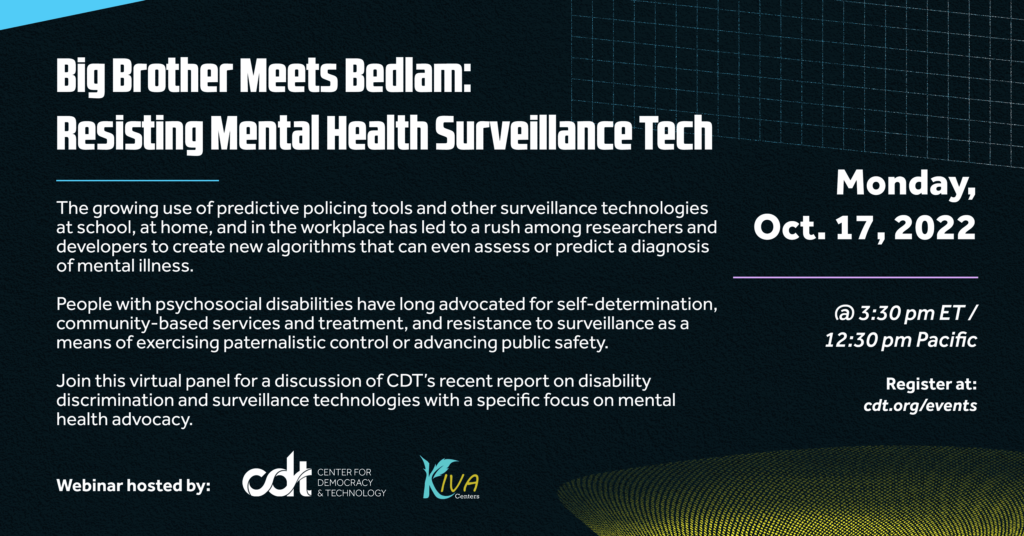Big Brother Meets Bedlam: Resisting Mental Health Surveillance Tech
Date
Time
Location
Online

Big Brother Meets Bedlam: Resisting Mental Health Surveillance Tech
In 2017, the FDA approved Abilify MyCite, a psychotropic medication that tracks whether a person has actually taken their pills and can send that data to their doctor. Policymakers routinely advocate for expanding and increasing surveillance over and institutionalisation of people with mental health disabilities.
The growing use of predictive policing tools and other surveillance technologies at school, at home, and in the workplace has led to a rush among researchers and developers to create new algorithms that can even assess or predict a diagnosis of mental illness. People with psychosocial disabilities have long advocated for self-determination, community-based services and treatment, and resistance to surveillance as a means of exercising paternalistic control or advancing public safety.
Join this panel for a discussion of CDT’s recent report on disability discrimination and surveillance technologies with a specific focus on mental health advocacy.
Date: October 17, 2022
Time: 3:30 pm Eastern / 12:30pm Pacific
Co-hosts:
*** Watch the recording here: https://youtu.be/YlVb4yCNt30
Questions: We will be accepting questions for speakers before and during the discussion. You can submit them via email at [email protected] or via Twitter at #CDTQuestions and @CenDemTech. For those joining via computer, you will be able to share your questions by using the chat.
Accessibility: If you have access needs or questions, please contact [email protected] in advance of the event.
Moderator: Karen Nakamura
- Professor Karen Nakamura is a cultural and visual anthropologist at the University of California Berkeley. Her first book was titled Deaf in Japan: Signing and the Politics of Identity (2006). Her next project resulted in two ethnographic films and a monograph titled, A Disability of the Soul: An Ethnography of Schizophrenia and Mental Illness in Contemporary Japan (2014). She is currently working on the intersections of transsexuality and disability politics in postwar Japan as well as a project on disability, technology, and access especially in the context of Artificial Intelligence (AI/ML).
Panelists:
- Leah Harris
- Leah Harris (they/she) is a mad, queer, disabled writer, facilitator, and advocate of Eastern European Jewish heritage. Their work focuses on access, autonomy, and choice, surveillance/tech in the mental health/suicide prevention space, the history of carceral mental health, and psychiatric abolition. Their writing has appeared in Rooted in Rights, the Disability Visibility Project, and Mad in America; and in the anthologies We’ve Been Too Patient: Voices from Radical Mental Health, Fat and Queer: An Anthology of Queer and Trans Bodies and Lives, and the forthcoming Mad Studies Reader. They live on stolen Manahoac lands, also known as Northern Virginia, USA. Twitter: @LeahIda
- Vesper Moore
- Vesper Moore (They/Them/Elle) is Chief Operating Officer at the Kiva Centers. They are a community activist, survivor, trainer, and writer. They have been a part of the Kiva Centers for several years and have been instrumental in the Kiva Centers’ growth as an organization. They have brought the perspectives of survivors to national and international spaces. They have experience working as a consultant for both the United States government and the United Nations in shaping strategies around trauma, intersectionality, and disability rights. They gave an address on “Intersectionality as a Human Rights Issue” for the UN’s Convention on the Rights of Persons with Disabilities (CRPD). They have been at the forefront of legislative reform to shift the societal paradigm around mental health. Vesper concentrates on building social movements and public knowledge to facilitate and sustain systems change. They are a skilled certified trainer of Intentional Peer Support and the MA Certified Peer Specialist Training. They have supported the development of peer-run organizations in different parts of the world. They have been a lecturer for many universities and institutions across the United States. They are a very well-known leader in peer support and are known as a powerful advocate. Vesper is also a skilled chess player and enjoys the late 80s/early 90s goth fashion, music, and film.
- Jalyn Radziminski
- Jalyn Radziminski is the Communications Manager for the Bazelon Center for Mental Health Law and is personally driven to unify academic, grassroots, nonprofit, legal, and policy initiatives to foster social and systematic change through intersectional and integrated approaches. Jalyn graduated from Emory University as the first Black woman, first Japanese woman, and the first first-generation college student to receive the Marion Luther Brittain Award, the highest, most prominent honor any Emory academic division can bestow. As an undergrad, Jalyn founded Emory’s Black Mental Health Ambassadors and was a founding council member of Mental Health America’s National Collegiate Mental Health Innovation Council. As an elected representative of Emory University Senate and founding executive member of Students for Prison Education and Resistance, Jalyn advocated for the Emory Incarceration Hardship Fund to help students impacted by incarceration. After graduation, Jalyn advocated for equity and inclusion in the voting and civic engagement space by working in Georgia as a Fair Fight Action Political Fellow and as Chief of Staff for the Georgia House of Representatives. Jalyn saw the need to encourage more diverse voter turnout and political participation in their home state, Indiana as well. Thus, Jalyn founded Count US IN, the first Indiana based initiative to educate and empower local voices as well highlight Indiana’s relevance in the national political conversations. Afterward, Jalyn became one of the American Association of People with Disabilities first Fannie Lou Hamer Organizers to increase Black, Disabled voter turnout nationwide. Radziminski also worked as Diversity Outreach Specialist at MARTA and served on the Bobby Dodd Institute’s steering committee to foster accessibility in transportation and employment.